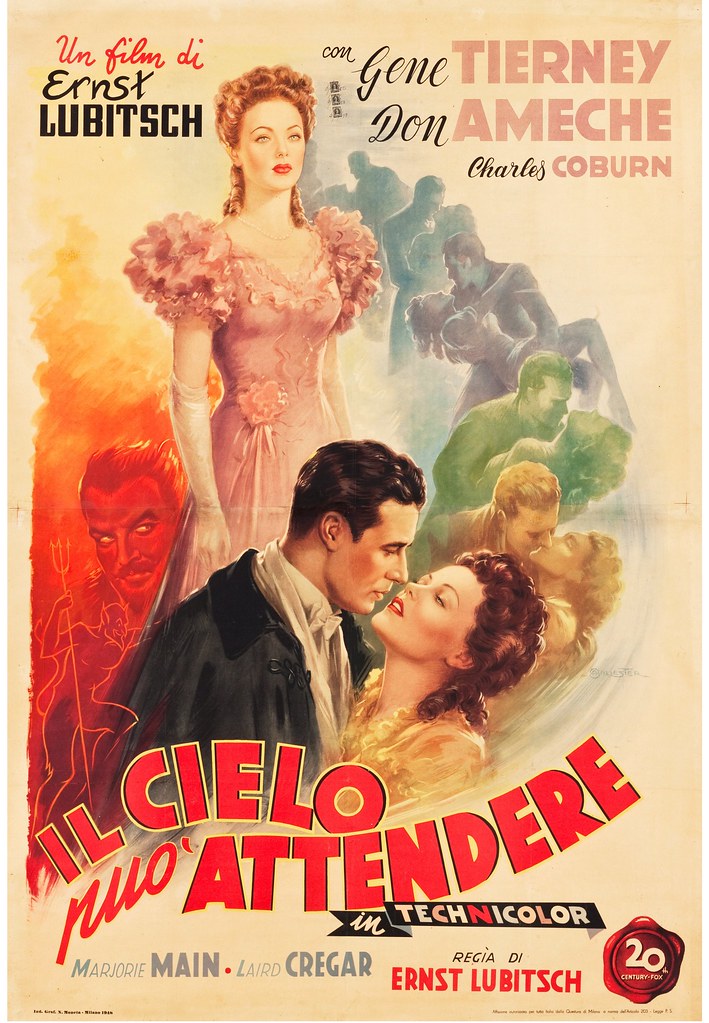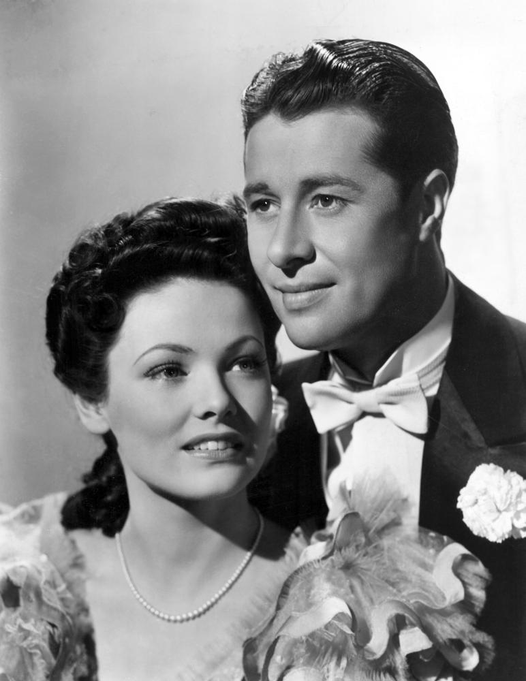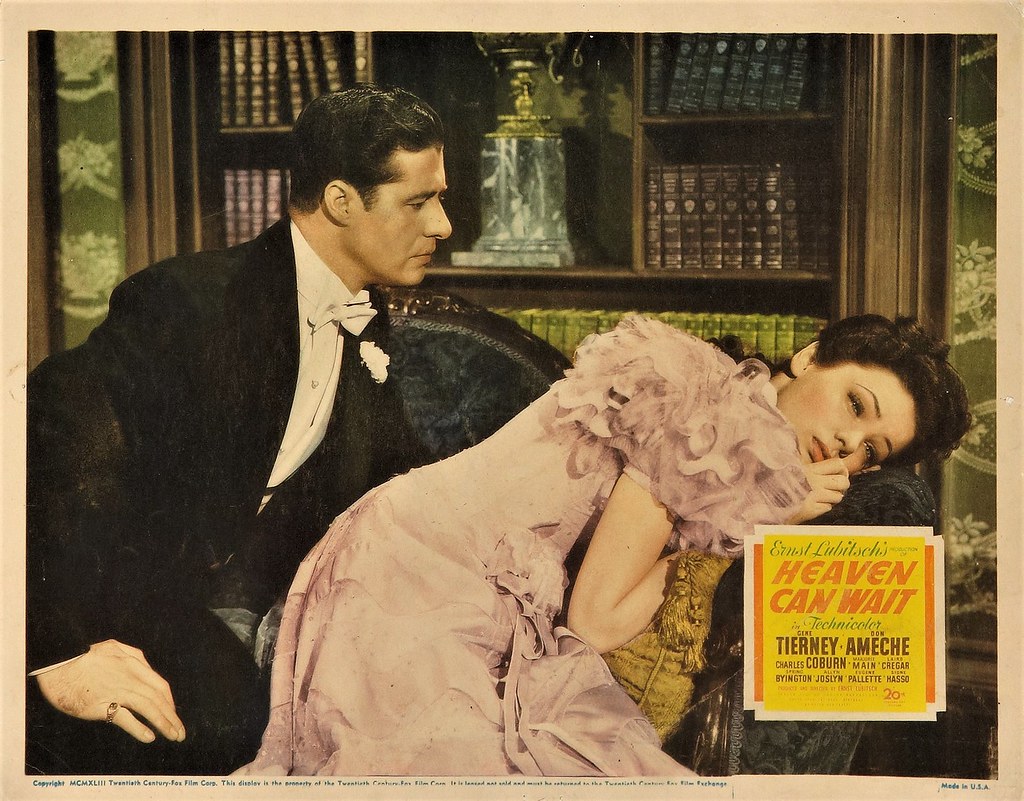We had a respectable turnout of 48 patrons for our screening of Heaven Can Wait (1943) on May 25, 2023. This was our final show in our series “The Lubitsch Touch,” which was an eleven film retrospective on director Ernst Lubitsch at the Park Ridge Public Library. (Actually, twelve films as we worked in one of the silent German films in which Lubitsch acted.) We averaged 42 patrons this spring– the majority were our regulars who enjoyed the pre-show documentaries/shorts as well as the talks I gave. There were many highlights this year: Jay Warren’s digital organ accompaniment to Rosita (1923), The Merry Widow (1934), and a screening of To Be or Not to Be, which is rarely shown, but the Library was able to secure the rights for what is arguably Lubitsch’s late-period masterpiece. The best film study course isn’t at the local high school, it’s at the Park Ridge Public Library Classic Film Series, and we are grateful to all those who came out these past three months to support the program and learn something about Ernst Lubitsch.
The following is a transcript of my introductory remarks on Heaven Can Wait… ~MCH
Italian poster for Heaven Can Wait.
It was shortly after signing a three-year contract with 20th Century Fox in 1943 that Ernst Lubitsch suffered a heart attack. Although he may not have known it at the time, it was the beginning of the end. He would eventually complete Heaven Can Wait, but his career would never be the same afterward. He would be severely hampered physically in the following years. Though Lubitsch would start several film projects in the remaining four years of his life, he would only be able to complete one other film, 1946’s Cluny Brown with Charles Boyer and Jennifer Jones.
Heaven Can Wait, although a comedy, is a film about mortality—an undercurrent that undoubtedly reflected Lubitsch’s own concerns at the time. In fact, mortality hovers over the entire picture. In this episodic story set in the 1890s and told in vibrant Technicolor, characters pass away as the story unfolds over the course of several decades; and yet their presence still hovers, whether it’s through a painting in the background or a book on the shelf that has special significance.
Don Ameche plays Henry Van Cleve, a somewhat irresponsible but charming rake who settles down after he meets Martha, played by Gene Tierney. Their marriage becomes strained by his philandering and he is forced to chase after his wife after she leaves him. Eugene Pallette and Marjorie Main play Martha’s well-off parents from Kansas, but it’s Charles Coburn who steals the film as Henry’s impish grandfather, the one who made all the money for the family. Henry’s story is told in flashback and begins after Henry has already died. In Hell, where he expects to be, he meets His Excellency, wonderfully played by Laird Cregar.
Although Lubitsch had made films before about Americans, this was his first film about America itself and the American family. It was important to him to bring this depiction of his adopted country to the movie screen. The story was based on a 1934 play called Birthdays by Leslie Bush-Fekete and adapted for the screen by Samson Rafaelson.
Heaven Can Wait is a film about a family– and not much else. As Lubitsch once wrote, “I encountered partly great resistance before I made this picture, because it had no message and made no point whatsoever. The hero was a man interested only in good living, with no aim of accomplishing anything, or doing anything noble.” Nevertheless, it’s a beautiful film that tells its tale in a leisurely fashion. It’s a historical film like many others that 20th Century Fox was known to make at that time, but it’s not about any specific event in history. Though seventy years are spanned, the film does not pause on any world events. The film is interested only in the Van Cleve family.
Heaven Can Wait was Lubitsch’s most successful film in America with a profit of $1.2 million, and it would be the last time Lubitsch would be nominated for Best Director—his first nomination since 1929’s The Love Parade.
After Heaven Can Wait, Lubitsch started other projects, but typically other directors came in to finish them. His last credited film was That Lady in Ermine, a musical with Douglas Fairbanks, Jr. and Betty Grable of all people. The film was taken over by Otto Preminger, whose heavy-handed approach destroyed whatever possibilities the film may have had. Preminger also restaged and reshot scenes and removed material Lubitsch had previously shot. The end result, which was released in 1948, was forgettable.
In March 1947, Lubitsch received a Lifetime Achievement Award from the Motion Picture Academy, but he died in November of that year from heart complications. Billy Wilder, a contemporary of his who was greatly influenced by Lubitsch, told the story of attending Lubitsch’s funeral with fellow director William Wyler and quietly walking back to their car. “Finally I said, just to say something to break the silence, ‘No more Lubitsch.’ To which Wyler replied, ‘Worse than that—no more Lubitsch films.’”
There will never be films like Lubitsch’s again. How films are made and viewed has changed. Our sensibilities are not the same. It’s important to remember, however, that Lubitsch was a mainstream filmmaker whose films respected the intelligence of his audience. But the sophistication that was apparent in his films does not exist in today’s mainstream market. The romantic comedy genre that he helped create is now one of coarseness and vulgarity. Lubitsch told his films in an indirect way to circumvent the strictures of the Production Code, so they are filled with subtlety and innuendo. He trusted his audience to understand what he was saying. He trusted the viewers to understand what was going on behind the closed door to the bedroom.
In Heaven Can Wait, the door closes on one of the most beautifully executed death scenes in any film. Henry has a final dream that incorporates the pleasures of Lubitsch’s own life—particularly the reference to cigars. But more tellingly, there is the musical reference to “The Merry Widow Waltz,” which instantly recalls one of Lubitsch’s greatest successes, 1934’s The Merry Widow. The scene must’ve been how Lubitsch would have wanted his own death to be like…

